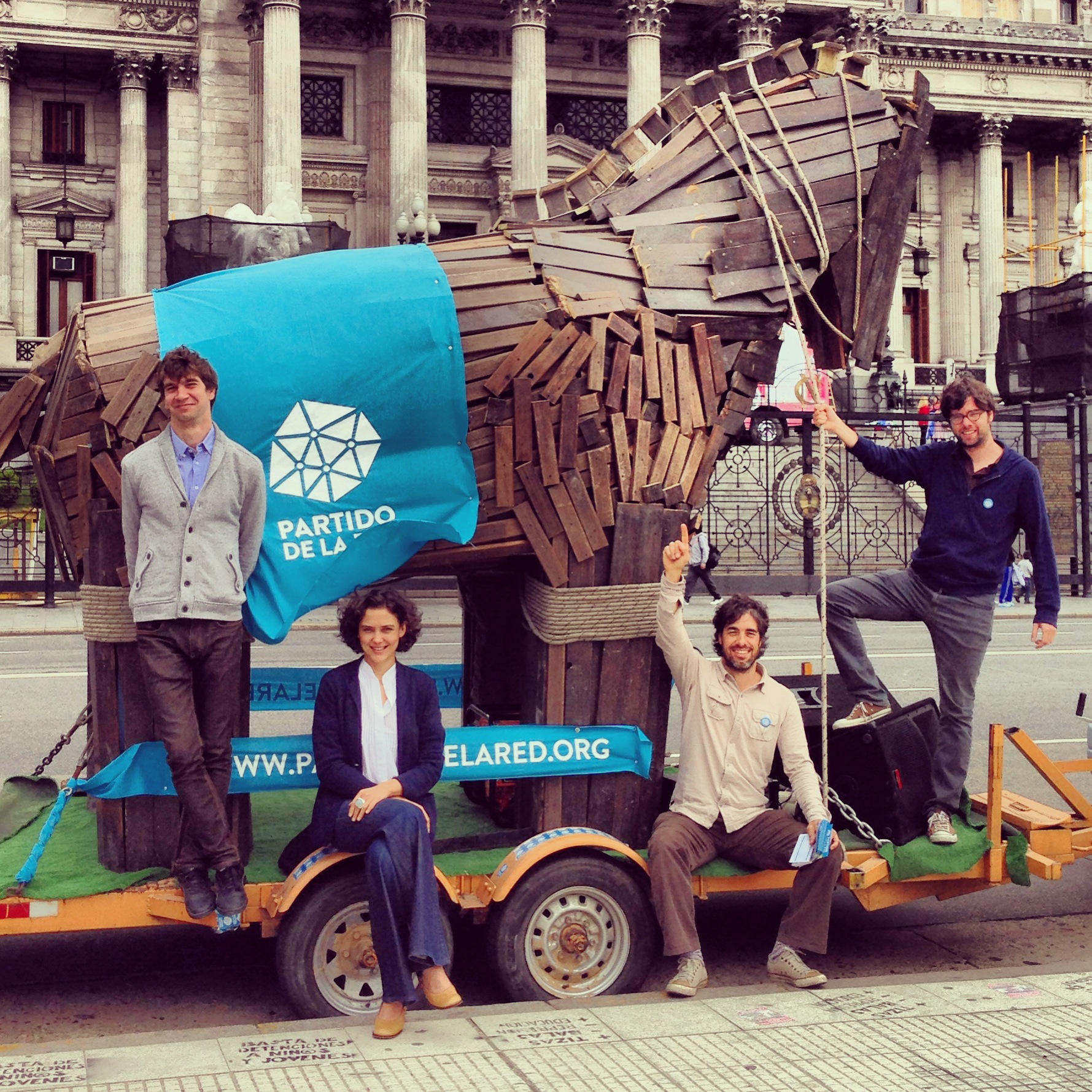Will the smartphone replace the ballot box?

Speaking at a TEDx event in Buenos Aires in 2013, Pia Mancini told a rapt audience that democracy is trapped in the past. To illustrate her point, she flashed up a slide depicting a typical political scene from the '70s.
Not the decade of oil shocks, rotary phones and Bubble Yum.
The 1770s.
"Our democratic mechanisms have barely changed since the 18th century," says Mancini, an Argentine political scientist. "We go to the polls every two or four years, elect a politician -- and hope for the best. We're facing a crisis of representation."
Several frustrating years spent pounding the campaign trail on behalf of traditional parties convinced Mancini that this problem was not going to be fixed using the same old tools. So in May 2012 she and a group of like-minded people formed Net Democracy, a Buenos Aires-based foundation whose raison d'être is to develop digital tools to bridge the widening fissure between government and governed.
Fat chance? Maybe. But don't judge until you've seen, compared and contrasted two digital innovations: DemocracyOS, Net Democracy's swiftly evolving vote-and-debate platform; and Legislemos.org, a citizen-facing consultative tool unveiled just last month by two national senators.
DemocracyOS, which is open source, can be used by any lawmaker in any legislature to canvass opinion among any group of citizens on any piece of legislation. It is, in the jargon, agile.
Users, who must sign up with their real names and provide proof of ID, can vote for or against a motion; abstain; or transfer their vote to someone they consider more knowledgeable on the subject.
Mike Bracken, a "civic hacker" since the mid 1990s and now the British government's executive director of digital, is impressed by DemocracyOS. He compares it with disruptive services like Taiwan's g0v.tw, and the suite of citizen empowerment tools developed by mySociety, the influential British NGO Bracken helped set up.
"The audacity of trying to create an operating system for democracy is something I applaud," he says. "In the 1990s we were a group of pub-going hackers in London who thought we'd cause a bit of mischief with one of the oldest parliaments in the world. These guys are doing it for real."

But how real? Currently in public beta, DemocracyOS has attracted over 3,000 users who can mock-vote on real-life laws as they pass through the Buenos Aires legislature. Real-life lawmakers in Argentina have proved more wary, though this hasn't stopped bodies as diverse as the Mexican government and a Tunisian human rights group from using the platform to consult voters and stakeholders on a variety of issues.
Knowing that most established politicians would welcome DemocracyOS much as a turkey welcomes Thanksgiving, Mancini and crew were careful to formulate an "offline" strategy too. In last October's national and local elections, candidates including Mancini and noted technologist Santiago Siri ran for the Buenos Aires legislature on a platform of digital democracy.
They called themselves the Net Party.
Grabbing attention with their "life-sized" Trojan Horse and manifesto written in Tweets, the party won 21,368 votes, or 1.16 per cent. This is better than it sounds: the party didn't officially exist until six weeks before polling day, and Argentina's voting system is heavily weighted against parties who run on a single ticket. (The Net Party came second among parties who ran for the Buenos Aires legislature only.)
If elected, candidates are bound by the party's constitution to vote on legislation in accordance with the majority will of their constituents, as expressed through DemocracyOS. But what about existing, more cautious lawmakers, who might want to use digital tools for consultative, rather than determinative, purposes?
Announcing itself across Buenos Aires in a blaze of billboards last month, Legislemos.org fills precisely that gap in the market. Like DemocracyOS, Let's Legislate! (as it can be roughly translated) enables citizens to discuss and vote on issues affecting Argentina and its capital city -- energy efficiency, public health, infrastructure and so on.
The platform differs from DemocracyOS in that it is proprietary rather than open source, and is being run not by activists but by elected politicians -- namely, senators Diego Santilli and Gabriela Michetti of PRO, Buenos Aires' ruling party.
"It's an experiment," says Mariano Barucca, co owner of Publiquest, the digital agency that developed Legislemos.org. "This is the first time that elected representatives in Argentina have consulted the public in this way. We see the tool as a kind of information thermometer, which can be used to take the public's temperature on crucial issues."
Mancini declares herself happy that Legislemos.org has opened up a new space for participation, putting the type of representation the Net Party advocates on the public agenda. "This is exactly what we were were hoping to achieve by funding DemocracyOS and by putting Net Party candidates up for election," she says. "We want traditional political parties to start piloting ways to open themselves up to citizen engagement."
More doctrinaire web activists might be inclined to dismiss Legislemos.org on the grounds that it's a closed platform. But Mike Bracken has no truck with purism for purity's sake.
"Let a thousand flowers bloom," he says. "The real question for Argentines both in and out of government is this: Are you going to use digital tools to have a crack at the most profound problems affecting your society? Or are you going to use digital to dress these problems up with some crowd-pleasing apps to keep a small, techno-political group happy?"
Now there's a motion worth voting on.
Related:
- Citizens harness the power of data in a blacked-out Buenos Aires
- The cybercafe is dead. Long live the 3D printing cafe?
- Can technology catch criminals in Brazil?
Photos: Partido de la Red (Net Party); Publiquest
Sign up for our weekly newsletter featuring in-depth business innovation stories by correspondents around the globe, top domestic reporters and thought-provoking opinion columnists.
This post was originally published on Smartplanet.com